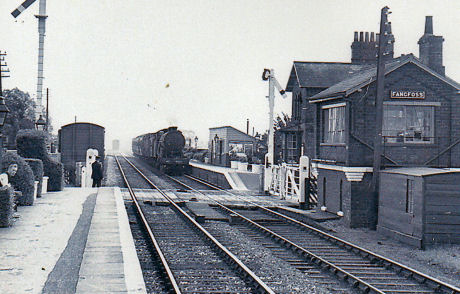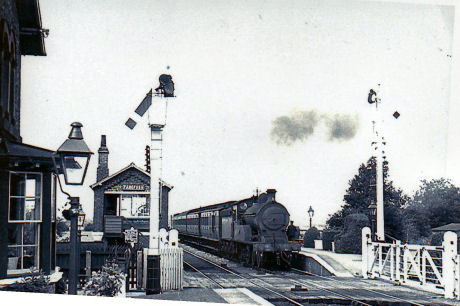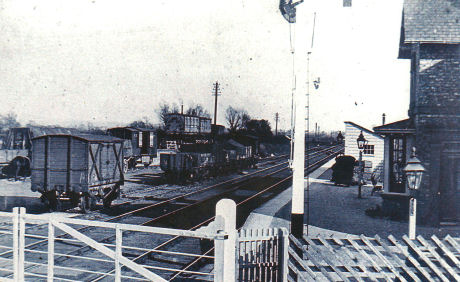 |
|
|
|
|
|
| These photographs are the photographs of Ted Westmorland who lived at Fangfoss station in 1950 and has provided the descriptions. Ted says Tommy Walker was stationmaster in 1950, and had been there quite a few years. His son Frank was railway policeman at York. As well as a stationmaster there was a booking office clerk, two porter/signal men, and one porter. There were also about six permanent weigh workers who used a little petrol engined buggy to travel up and down the line.. |
|
 |
| The Loco is an ex-Great Northern 4-4-2, the station master is standing by the crossing gate post. The wooden hut this side of the signal box was the lamp room where the oil lamps were trimmed and filled. It smelled very strongly of paraffin. Ted Westmorland thinks the photo was 1935. |
 |
| The train here is from the Hull shed. It shows a stopping train from York to Hull. The loco is an ex-Northern Eastern 4-4-0 the last of this type were scrapped in the mid 1950's. |
 |
| This was taken from the top of the signal box steps The two sidings into the goods yard can be seen. The coal drops siding can be seen the background, with a couple of very old (1850's) coaches that have been retired and are in use as Engineers stores/Living vans and are probably being used for maintenance on the weigh bridge, which is on the other side of the coal drops. The long siding for holding trains is an extension of the nearside siding, and runs off into the distance towards Pocklington. The RAF siding was installed in 1943, when the construction of Full Sutton was underway. It left the coal siding at the foot of the incline and ran down almost to the weighbridge office. It was still in use in the 1950's. |
A further memory of Ted is of Full Sutton airfield:
I think the aerodrome was operational from late 1943, but I can only say from what I heard from some of the old farmhands, I think the only planes that flew there in the war were Halifax bombers. When we moved there in 1950, it was in use as a training station, flying Vampires and Meteors, many crashes from the Meteors, one hit a goods train just on the York side of Full Sutton level crossing. There were vans, coals an trucks thrown all over the place and I don't think the aircrew survived.
|
| |
|
|
|

